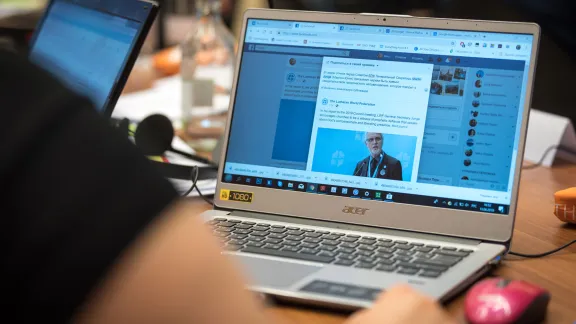
Photo: LWF
LWF General Secretary Report to the Executive Committee
(LWI) – The changes brought about by the coronavirus disease (COVID-19) pandemic across the world have compelled The Lutheran World Federation (LWF) to reassess how it implements its fundamental vocation of being a responsive instrument of the communion’s member churches and the communities they serve in a context that is dramatically changed. With all the uncertainty about how the COVID-19 pandemic “will reshape things in the world, there is already one certainty: the LWF has a key role to play in the response.”
LWF General Secretary Rev. Dr Martin Junge made this assertion in his report to the LWF Executive Committee, which is holding an exceptional online meeting 10-16 June. The committee will take necessary governance decisions as delegated by the Council, which cancelled its regular meeting due to COVID-19.
Junge emphasized that the Lutheran communion’s fundamental vocation and shared priorities “are conveyed concisely” in the LWF Strategy 2019-2024, and “remain the key point of departure.” However, in view of the current and changing contexts in which these commitments will be lived out, this situation calls for reassessment of how programmatic work and its realignment to both the new contexts and the new funding realities, Junge said.
The general secretary described the global emergence of the virus as an existential and spiritual challenge, which has exposed what holds together the political, social, economic, spiritual and ecological fabric of societies and humankind. “Where these seams were already weak, COVID-19 is now tearing them apart,” and “we are only starting to see the world plunging into a deep global economic recession,” due to government-imposed lockdowns, physical and social distancing measures to curb the virus spread.
New thinking is required not only around emerging theological questions on how to be church while not bringing people together in person for worship, groups, and service, but also on diaconal work, and churches’ economy, whether based on Sunday collections or other income sources.
As the LWF relies on churches and other funding organizations that are affected by the COVID-19 impact, uncertainty on how the pandemic will develop further makes it “extremely hard to tell how things will look like in the coming months, let alone in a year,” Junge said.
These challenges, he said, present an opportunity “to learn how to function and interact in a truly global and polycentric way.”
Realignment to new contexts
At the same time, member churches have identified isolation, hunger, violence, and trauma/mental health as key issues to address in their ongoing ministries amid a tremendous need for theological and pastoral support, and diakonia. People facing unemployment, hate, xenophobia, pervasive poverty, potential for famine, increased violence against women and a host of other gruesome projections “are going from one shock to the next, without time to heal or process what they are experiencing.”
He described the recently launched COVID-19 Rapid Response Fund as one way of supporting churches’ vital ministry and witness as they respond locally to the pandemic, offering “a presence of healing, compassion, and hope” to suffering people.
The impact of COVID-19 on World Service, which has over 9,000 staff in its country programs and emergency operations, includes reorganization of activities to ensure protection of staff and the communities they serve. One of the major concerns however, is that donors will begin diverting funding from already fragile contexts to respond to short-term challenges, which would result in more suffering for the populations. In this regard, Junge expressed gratitude for LWF’s representation on the Steering Committee for Humanitarian Response. The committee brings together leading humanitarian organisations to share analysis and learning, and promote greater accountability and impact of humanitarian actions.
Online collaboration that strengthens relations
LWF’s COVID-19 mitigation measures include suspension of all travel and international meetings until September or beyond and a work-from-home policy for all staff since March until the end of June.
Junge commended the new online collaboration as “a solid foundation for the changed approaches we need to be thinking of while projecting ourselves into the ‘new normal’ of the LWF.” This would require IT infrastructure investment and entail a deliberate effort to include churches where technical pre-conditions are not easily available. While not intended to replace face-to-face meetings, it adds value in terms of ecological and financial considerations and the potential to engage more stakeholders in a sustainable way.
The LWF enters this period of uncertainty out of a position of strength and with a clear vision and calling. Speaking to the Executive Committee, the general secretary said this was a time to strengthen our global structures and collaboration, while empowering the local churches.
The Executive Committee oversees the proper functioning of the LWF between Council meetings, and normally convenes twice a year. Chaired by LWF President Archbishop Dr Panti Filibus Musa from Nigeria, its members include the seven regional Vice-Presidents, chairpersons of the Finance Committee, Committee for World Service and the specified Committees. Members of the Communion Office Leadership Team also attend its meetings.


